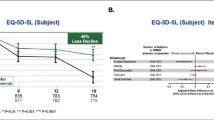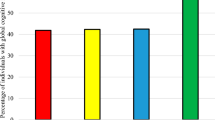Abstract
Purpose
The impact of brain tumour on subjective cognitive function (SCF) has received little attention despite the implications of these perceptions for quality of life. SCF consists of two related yet distinct components, perceived cognitive impairment (PCI) and perceived cognitive abilities (PCA). This study compared the SCF of adult brain tumour survivors and healthy controls and examined demographic, illness-related, and psychological factors associated with SCF.
Method
Sixty-five adult survivors with primary brain tumour (age, 22–75 years), and 65 age- and sex-matched controls were recruited. Participants with brain tumour completed the Brief Test of Adult Cognition by Telephone, Functional Assessment of Cancer Therapy–Cognitive Function (FACT-Cog), ratings of physical symptoms, Depression Scale of the Depression Anxiety Stress Scales-21 (DASS-Depression), and Generalized Anxiety Disorder-7 (GAD-7) scale. Controls completed the FACT-Cog, DASS-Depression, and GAD-7.
Results
Adult brain tumour survivors reported significantly greater PCI and lower PCA than controls, after accounting for anxiety. Higher PCI was significantly related to fatigue, pain, treatment-related side-effects, anxiety, and depression. Lower PCA was significantly associated with fatigue, pain, poorer objective cognitive function, lower education, anxiety, and depression. Anxiety uniquely accounted for 9–14% of variance in SCF.
Conclusions
Adult brain tumour survivors were found to experience poorer SCF than healthy controls after accounting for anxiety. SCF was related to multiple factors after brain tumour; however, an independent association with anxiety was identified.
Implications for Cancer Survivors
These findings highlight the potential value of psychological interventions targeting anxiety and cognitive effects to improve quality of survivorship after brain tumour.
Similar content being viewed by others
References
Leece R, Xu J, Ostrom QT, Chen Y, Kruchko C, Barnholtz-Sloan JS. Global incidence of malignant brain and other central nervous system tumors by histology, 2003–2007. Neuro-Oncology. 2017;19(11):1553–64. https://doi.org/10.1093/neuonc/nox091.
Ownsworth T, Hawkes AL, Chambers S, Walker DG, Shum D. Applying a biopsychosocial perspective to investigate factors related to emotional adjustment and quality of life for individuals with brain tumour. Brain Impairment. 2010;11(3):270–80. https://doi.org/10.1375/brim.11.3.270.
Ownsworth T, Henderson L, Chambers SK. Social support buffers the impact of functional impairments on caregiver psychological well-being in the context of brain tumor and other cancers. Psycho-Oncology. 2010;19(10):1116–22. https://doi.org/10.1002/pon.1663.
Gehrke AK, Baisley MC, Sonck AL, Wronski SL, Feuerstein M. Neurocognitive deficits following primary brain tumor treatment: systematic review of a decade of comparative studies. J Neuro-Oncol. 2013;115(2):135–42. https://doi.org/10.1007/s11060-013-1215-2.
Hutchinson AD, Hosking JR, Kichenadasse G, Mattiske JK, Wilson C. Objective and subjective cognitive impairment following chemotherapy for cancer: a systematic review. Cancer Treat Rev. 2012;38(7):926–34. https://doi.org/10.1016/j.ctrv.2012.05.002.
Ownsworth T. Coping with the unthinkable: psychosocial advances in the management of primary brain tumour. Brain Impairment. 2016;17(3):265–72. https://doi.org/10.1017/BrImp.2016.19.
Klein M, Taphoorn MJ, Heimans JJ, van der Ploeg HM, Vandertop WP, Smit EF, et al. Neurobehavioral status and health-related quality of life in newly diagnosed high-grade glioma patients. J Clin Oncol. 2001;19(20):4037–47. https://doi.org/10.1200/jco.2001.19.20.4037.
Meyers CA, Smith JA, Bezjak A, Mehta MP, Liebmann J, Illidge T, et al. Neurocognitive function and progression in patients with brain metastases treated with whole-brain radiation and motexafin gadolinium: results of a randomized phase iii trial. J Clin Oncol. 2004;22(1):157–65. https://doi.org/10.1200/JCO.2004.05.128.
Tucha O, Smely C, Preier M, Lange KW. Cognitive deficits before treatment among patients with brain tumors. Neurosurgery. 2000;47(2):324–33. https://doi.org/10.1097/00006123-200008000-00011.
Dwan TM, Ownsworth T, Chambers S, Walker DG, Shum DH. Neuropsychological assessment of individuals with brain tumor: comparison of approaches used in the classification of impairment. Front Oncol. 2015;5:56. https://doi.org/10.3389/fonc.2015.00056.
Biglia N, Bounous V, Malabaila A, Palmisano D, Torta D, d'Alonzo M, et al. Objective and self-reported cognitive dysfunction in breast cancer women treated with chemotherapy: a prospective study. Eur J Cancer Care. 2012;21(4):485–92. https://doi.org/10.1111/j.1365-2354.2011.01320.x.
Ganz PA, Petersen L, Castellon SA, Bower JE, Silverman DH, Cole SW, et al. Cognitive function after the initiation of adjuvant endocrine therapy in early-stage breast cancer: an observational cohort study. J Clin Oncol. 2014;32(31):3559–67. https://doi.org/10.1200/JCO.2014.56.1662.
Janelsins MC, Kohli S, Mohile SG, Usuki K, Ahles TA, Morrow GR. An update on cancer-and chemotherapy-related cognitive dysfunction: current status. Semin Oncol. 2011;38(3):431–8. https://doi.org/10.1053/j.seminoncol.2011.03.014.
Noggle CA, Dean RS. The neuropsychology of cancer and oncology. New York, NY: Springer Pub; 2013.
Gehring K, Taphoorn MJ, Sitskoorn MM, Aaronson NK. Predictors of subjective versus objective cognitive functioning in patients with stable grades II and III glioma. Neuro-Oncol Pract. 2015;2(1):20–31. https://doi.org/10.1093/nop/npu035.
Klein M, Heimans J, Aaronson N, Van der Ploeg H, Grit J, Muller M, et al. Effect of radiotherapy and other treatment-related factors on mid-term to long-term cognitive sequelae in low-grade gliomas: a comparative study. Lancet. 2002;360(9343):1361–8. https://doi.org/10.1016/s0140-6736(02)11398-5.
Pranckeviciene A, Deltuva VP, Tamasauskas A, Bunevicius A. Association between psychological distress, subjective cognitive complaints and objective neuropsychological functioning in brain tumor patients. Clin Neurol Neurosurg. 2017;163:18–23. https://doi.org/10.1016/j.clineuro.2017.10.007.
Reid-Arndt SA, Hsieh C, Perry MC. Neuropsychological functioning and quality of life during the first year after completing chemotherapy for breast cancer. Psycho-Oncology. 2010;19(5):535–44. https://doi.org/10.1002/pon.1581.
Shilling V, Jenkins V. Self-reported cognitive problems in women receiving adjuvant therapy for breast cancer. Eur J Oncol Nurs. 2006;11(1):6–15. https://doi.org/10.1016/j.ejon.2006.02.005.
Dhillon HM, Tannock IF, Pond GR, Renton C, Rourke SB, Vardy JL. Perceived cognitive impairment in people with colorectal cancer who do and do not receive chemotherapy. J Cancer Surviv. 2017;12:1–8. https://doi.org/10.1007/s11764-017-0656-6.
Janelsins MC, Heckler CE, Peppone LJ, Kamen C, Mustian KM, Mohile SG, et al. Cognitive complaints in survivors of breast cancer after chemotherapy compared with age-matched controls: an analysis from a nationwide, multicenter, prospective longitudinal study. J Clin Oncol. 2017;35(5):506–14. https://doi.org/10.1200/JCO.2016.68.5826.
Lange M, Heutte N, Morel N, Eustache F, Joly F, Giffard B. Cognitive complaints in cancer: the French version of the Functional Assessment of Cancer Therapy–Cognitive Function (FACT-Cog), normative data from a healthy population. Neuropsychol Rehabil. 2016;26(3):392–409. https://doi.org/10.1080/09602011.2015.1036890.
Mehnert A, Scherwath A, Schirmer L, Schleimer B, Petersen C, Schulz-Kindermann F, et al. The association between neuropsychological impairment, self-perceived cognitive deficits, fatigue and health related quality of life in breast cancer survivors following standard adjuvant versus high-dose chemotherapy. Patient Educ Couns. 2006;66(1):108–18. https://doi.org/10.1016/j.pec.2006.11.005.
Schagen SB, Boogerd W, Muller MJ, Ten Bokkel Huinink W, Moonen L, Meinhardt W, et al. Cognitive complaints and cognitive impairment following BEP chemotherapy in patients with testicular cancer. Acta Oncol. 2008;47(1):63–70. https://doi.org/10.1080/02841860701518058.
Vardy JL, Stouten-Kemperman MM, Pond G, Booth CM, Rourke SB, Dhillon HM, et al. A mechanistic cohort study evaluating cognitive impairment in women treated for breast cancer. Brain Imaging Behav. 2017;13:1–12. https://doi.org/10.1007/s11682-017-9728-5.
Weis J, Poppelreuter M, Bartsch HH. Cognitive deficits as long-term side-effects of adjuvant therapy in breast cancer patients: ‘subjective’ complaints and ‘objective’ neuropsychological test results. Psycho-Oncology. 2009;18(7):775–82. https://doi.org/10.1002/pon.1472.
Green HJ, Pakenham KI, Gardiner RA. Cognitive deficits associated with cancer: a model of subjective and objective outcomes. Psychol Health Med. 2005;10(2):145–60. https://doi.org/10.1080/13548500500093308.
Jenkins V, Shilling V, Deutsch G, Bloomfield D, Morris R, Allan S, et al. A 3-year prospective study of the effects of adjuvant treatments on cognition in women with early stage breast cancer. Br J Cancer. 2006;94(6):828–34. https://doi.org/10.1038/sj.bjc.6603029.
Cochereau J, Herbet G, Duffau H. Patients with incidental WHO grade II glioma frequently suffer from neuropsychological disturbances. Acta Neurochir. 2016;158(2):305–12. https://doi.org/10.1007/s00701-015-2674-3.
Wagner LI, Sweet J, Butt Z, Lai JS, Cella D. Measuring patient self-reported cognitive function: development of the functional assessment of cancer therapy-cognitive function instrument. J Support Oncol. 2009;7(6):W32–W9.
Lai J-S, Wagner LI, Jacobsen PB, Cella D. Self-reported cognitive concerns and abilities: two sides of one coin? Psycho-Oncology. 2014;23(10):1133–41. https://doi.org/10.1002/pon.3522.
Joly F, Lange M, Rigal O, Correia H, Giffard B, Beaumont JL, et al. French version of the functional assessment of cancer therapy–cognitive function (FACT-Cog) version 3. Support Care Cancer. 2012;20(12):3297–305.
Cheung YT, Lim SR, Shwe M, Tan YP, Chan A. Psychometric properties and measurement equivalence of the English and Chinese versions of the functional assessment of cancer therapy-cognitive in Asian patients with breast cancer. Value Health. 2013;16(6):1001–13. https://doi.org/10.1016/j.jval.2013.06.017.
Lovibond PF, Lovibond SH. Manual for the depression anxiety stress scales: Psychology Foundation of Australia; 1996.
Spitzer RL, Kroenke K, Williams JBW, Löwe B. A brief measure for assessing generalized anxiety disorder: the GAD-7. Arch Intern Med. 2006;166(10):1092–7. https://doi.org/10.1001/archinte.166.10.1092.
Ownsworth T, Little T, Turner B, Hawkes A, Shum D. Assessing emotional status following acquired brain injury: the clinical potential of the depression, anxiety and stress scales. Brain Inj. 2008;22(11):858–69. https://doi.org/10.1080/02699050802446697.
Arnold SD, Forman LM, Brigidi BD, Carter KE, Schweitzer HA, Quinn HE, et al. Evaluation and characterization of generalized anxiety and depression in patients with primary brain tumors. Neuro-Oncology. 2008;10(2):171–81. https://doi.org/10.1215/15228517-2007-057.
Cella DF, Tulsky DS, Gray G, Sarafian B, Linn E, Bonomi A, et al. The Functional Assessment of Cancer Therapy scale: development and validation of the general measure. J Clin Oncol. 1993;11(3):570–9. https://doi.org/10.1200/jco.1993.11.3.570.
Tun PA, Lachman ME. Telephone assessment of cognitive function in adulthood: The Brief Test of Adult Cognition by Telephone. Age Ageing. 2006;35(6):629–32. https://doi.org/10.1093/ageing/afl095.
Song M-K, Ward SE, Bair E, Weiner LJ, Bridgman JC, Hladik GA, et al. Patient-reported cognitive functioning and daily functioning in chronic dialysis patients: cognitive and daily functioning in dialysis patients. Hemodial Int. 2015;19(1):90–9. https://doi.org/10.1111/hdi.12202.
Jones S, Ownsworth T, Shum DH. Feasibility and utility of telephone-based psychological support for people with brain tumor: a single-case experimental study. Front Oncol. 2015;5:71. https://doi.org/10.3389/fonc.2015.00071.
Hong WK, Bast RC, Hait WN, Kufe DW, Pollock RE, Weischselbaum RR, et al. Holland-Frei cancer medicine. 8th ed: PMPH-USA; 2010. p. 881.
Isaacs C, Rebbeck TR. Hereditary breast cancer. New York: Informa Healthcare; 2008. p. 99.
Eysenck MW, Calvo MG. Anxiety and performance: the processing efficiency theory. Cognit Emot. 1992;6(6):409–34. https://doi.org/10.1080/02699939208409696.
Robinson OJ, Vytal K, Cornwell BR, Grillon C. The impact of anxiety upon cognition: perspectives from human threat of shock studies. Front Hum Neurosci. 2013;7:203. https://doi.org/10.3389/fnhum.2013.00203.
Vytal KE, Cornwell BR, Letkiewicz AM, Arkin NE, Grillon C. The complex interaction between anxiety and cognition: insight from spatial and verbal working memory. Front Hum Neurosci. 2013;7:93. https://doi.org/10.3389/fnhum.2013.00093.
Wetherell JL, Wetherell JL, Reynolds CA, Reynolds CA, Gatz M, Gatz M, et al. Anxiety, cognitive performance, and cognitive decline in normal aging. J Gerontol - Series B Psychol Sci Soc Sci. 2002;57(3):P246–P55. https://doi.org/10.1093/geronb/57.3.P246.
Comijs H, Deeg D, Dik M, Twisk J, Jonker C. Memory complaints; the association with psycho-affective and health problems and the role of personality characteristics: a 6-year follow-up study. J Affect Disord. 2002;72(2):157–65. https://doi.org/10.1016/S0165-0327(01)00453-0.
McDougall GJ, Kang J. Memory self-efficacy and memory performance in older males. Int J Mens Health. 2003;2(2):131–47. https://doi.org/10.3149/jmh.0202.131.
Malec JF, Brown AW, Moessner AM, Stump TE, Monahan P. A preliminary model for posttraumatic brain injury depression. Arch Phys Med Rehabil. 2010;91(7):1087–97. https://doi.org/10.1016/j.apmr.2010.04.002.
Armstrong TS. Symptoms experience: a concept analysis. Oncol Nurs Forum. 2003;30(4):601–6. https://doi.org/10.1188/03.ONF.601-606.
Piil K, Juhler M, Jacobsen J, Jarden M. Controlled rehabilitative and supportive care intervention trials in patients with high-grade gliomas and their caregivers: a systematic review. BMJ Support Palliat Care. 2016;6(1):27–34. https://doi.org/10.1136/bmjspcare-2013-000593.
Piet J, Würtzen H, Zachariae R. The effect of mindfulness-based therapy on symptoms of anxiety and depression in adult cancer patients and survivors: a systematic review and meta-analysis. J Consult Clin Psychol. 2012;80(6):1007–20. https://doi.org/10.1037/a0028329.
Pace A, Dirven L, Koekkoek JA, Golla H, Fleming J, Rudà R, et al. European Association for Neuro-Oncology (EANO) guidelines for palliative care in adults with glioma. Lancet Oncol. 2017;18(6):e330–e40. https://doi.org/10.1016/S1470-2045(17)30345-5.
Ownsworth T, Chambers S, Damborg E, Casey L, Walker DG, Shum DHK. Evaluation of the making sense of brain tumor program: a randomized controlled trial of a home-based psychosocial intervention. Psycho-Oncology. 2015;24(5):540–7. https://doi.org/10.1002/pon.3687.
Acknowledgements
The authors would like to thank the Griffith University School of Applied Psychology for the publication scholarship, awarded to the first author. We would also like to thank all of the participants of the study.
Author information
Authors and Affiliations
Corresponding author
Ethics declarations
Ethical clearance was obtained through hospital and university ethics committees. Adult brain tumour survivors were approached by treating professionals who provided an overview of the study and obtained initial verbal consent for researchers to contact prospective participants. Informed consent was obtained from all individual participants included in the study.
Conflict of interest
The authors declare that they have no conflicts of interest.
Additional information
Publisher’s note
Springer Nature remains neutral with regard to jurisdictional claims in published maps and institutional affiliations.
Rights and permissions
About this article
Cite this article
Nicol, C., Ownsworth, T., Cubis, L. et al. Subjective cognitive functioning and associations with psychological distress in adult brain tumour survivors. J Cancer Surviv 13, 653–662 (2019). https://doi.org/10.1007/s11764-019-00784-8
Received:
Accepted:
Published:
Issue Date:
DOI: https://doi.org/10.1007/s11764-019-00784-8




